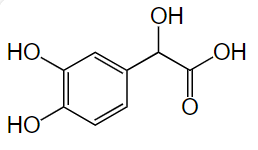3,4-Dihydroxymandelic Acid Analysis Service
- Highly sensitive and reliable: UPLC-MS/MS technique for accurate quantification
- Experienced team: Well-experienced scientists providing in-depth data interpretation
- Customized solution: Each project is precisely tailored to meet your specific research needs
- Fast Turnaround: The process from sample handling to report generation is efficient, shortening the analysis cycle.
- Clinical diagnosis and monitoring
- Neurochemical research
- Drug metabolism and toxicology studies
- Animal tissue ≥ 100 mg
- Plant tissue ≥ 200 mg
- Serum/ Plasma ≥ 200 μL
- Urine ≥ 2 mL
3,4-Dihydroxymandelic Acid (DHMA) is a catecholamine metabolite that is primarily derived from the adrenal gland and sympathetic nerve tissues. It is a vital intermediary in the norepinephrine and epinephrine biosynthesis pathway and serves as a biological marker for catecholamine-secreting tumors. Structurally, DHMA possesses a catechol nucleus and a carboxyl group, contributing to its distinctive properties and functions. Its metabolism involves enzymatic processes like decarboxylation, O-methylation, and glucuronidation, culminating in its excretion in urine.

Figure 1. The Structure of 3,4-Dihydroxymandelic Acid
Assessing DHMA levels is clinically significant in diagnosing and monitoring the treatment of neuroblastoma, pheochromocytoma, and paraganglioma, as well as various disorders related to catecholamine metabolism. Furthermore, DHMA is a valuable biological marker in neurochemical research, with potential applications in understanding neurodegenerative and psychiatric disorders.
MtoZ Biolabs offers comprehensive 3,4-Dihydroxymandelic acid analysis service. We employ Ultra-Performance Liquid Chromatography-Tandem Mass Spectrometry (UPLC-MS/MS) techniques for precise and reliable analysis of 3,4-Dihydroxymandelic Acid levels. Our well-experienced scientists ensure you high sensitivity and accuracy analysis service.
Analysis Workflow

Service Advantages
Applications
Our DHMA analysis service is applicable in a broad spectrum of research, including:
Sample Submission Requirements
1. Sample Types
Serum, plasma, urine, tissues and other biological samples. For each sample, more than 3 materials of the same condition must be selected.
2. Sample Volume
3. Sample Preservation
Samples should be stored at -80°C to maintain stability.
Note: Please provide details on sample collection and handling.
Deliverables
1. Experimental Procedures
2. Relevant Liquid Chromatography and Mass Spectrometry Parameters
3. Detailed Information on 3,4-Dihydroxymandelic Acid
4. Raw Data
5. Custom Analysis Report
At MtoZ Biolabs, we are dedicated to providing you with the most reliable and accurate 3,4-Dihydroxymandelic Acid Analysis Service. Our experienced team is committed to assisting you in all your research needs.
How to order?







